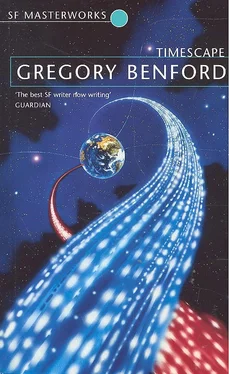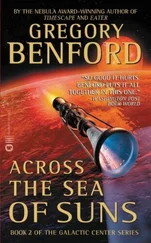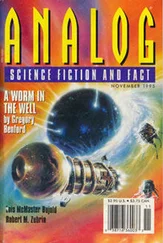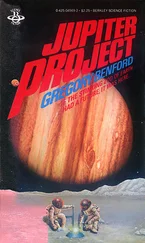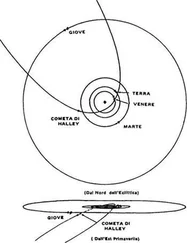“I was on a postdoc at Imperial College in London. I’m a mathematician. I teach at UCSD now.” She was smiling as she watched him, expecting a reaction of surprise. Peterson did not show it. “I can see you expected something like a philosophy degree.”
“Oh, no, nothing so conventional,” he said smoothly, smiling back at her. He thought of philosophers as people who spent great swaths of time on questions of no more true depth than “If there is no God, then who pulls up the next Kleenex?” He was about to form this into an epigram when Kiefer came back into the room with a glass of wine and a small bottle.
“Here’s your wine, love. And some lemon juice”—this to Peterson. “How much, just a dash?”
“That’s splendid, thank you.”
Kiefer sat down and turned to Peterson. “Did Mitsuoko tell you that she spent a year at London University? She’s a brilliant woman, my wife. Ph.D. at twenty-five. Brilliant and beautiful too. I’m a lucky man.” He beamed proudly at her.
“Alex, don’t do that.” The words were sharp but her affectionate smile took the edge off them. She shrugged deprecatingly towards Peterson. “It’s embarrassing. Alex is always boasting about me to his friends.”
“I can understand why.” Behind Peterson’s blandly smiling exterior he calculated. He had only one evening. Did they have an open marriage? How direct an approach would she tolerate? How to broach the subject with Kiefer there? “Your husband tells me that things are pretty bad here too, although it doesn’t look that way to a visitor.”
What did her smile mean? It was almost as though they shared a secret. Was she in fact reading his thoughts? Was she merely flirting? Or could it be—the thought flashed upon him—that she was nervous? She was certainly sending him signals.
“There’s a psychological inability to give up luxury standards,” Kiefer was saying. “People won’t give up a life style that they think is, ah, uniquely American.”
“Is that a current catch phrase?” Peterson asked. “I saw it used in a couple of magazines I read on the plane.”
Kiefer gave this hypothesis his best concerned frown. “Um, ‘uniquely American’? Yeah, I suppose it is. Saw an editorial about something like that this week. Oh, say, excuse me, I’ll go check the boys.”
Kiefer left the room in his eager-terrier style. In a moment Peterson could hear him talking mildly but firmly to the boys somewhere down the hall. They regularly interrupted him with tenor bright-boy-aware-that-he-is-being-bright backtalk. Peterson took a pull on his drink and reflected on the wisdom of proceeding further with Mitsuoko. Kiefer was a link in Peterson’s information-gathering chain, the most essential part of an executive’s working machinery. This was indeed California, notorious California, and the date was well advanced beyond the nineteenth century, but one could never be sure how a husband would react to these things, never mind what they said in theory about the whole matter. But beyond such calculations was the fact that the man irritated him with his fanaticism about health foods and nonsmoking and undignified devotion to those decidedly unpleasant children.
Well, executives were supposed to be able to make quick, incisive decisions, correct? Correct.
He turned to Mitsuoko, seeking the best way to use these moments alone. She was staring out at the view, which she must have memorized ages ago.
Before he could formulate an opening she asked, not looking at him, “Where are you staying, Mr. Peterson?”
“La Valencia. And the name is Ian.”
“Ah, yes. There’s a nice strip of beach there, south of the cove. I often take a walk there in the evenings.” She looked directly at him. “About ten o’clock.”
“I see,” Peterson replied. He felt a pulse beating in his neck. It was the only outward sign of excitement. By God, she had done it. She had made an assignation with him almost under her husband’s nose. Christ, what a woman.
Kiefer came back into the room. “There’s a growing crisis here,” he said.
Petersen gave a snort of laughter which he deftly turned into a cough.
“I think you’re right,” he managed drily. He dared not look at Mitsuoko.
• • •
On the long flight over the pole Peterson had time to browse through the file from Caltech. He felt relaxed and pleasantly dissipated, with the slack sensation one gets when he knows he has done quite as much as could be expected along the lines of self-indulgence. No regrets, that was the ticket; it meant one had passed up nothing. To reach the grave with that assurance would surely be at least comforting.
Mitsuoko had rather lived up to the subliminal advanced billing. She had cleared off after three hours, presumably with some solid story, or better, a tacit agreement of no questions from Kiefer. A suitable topping off for a wearing trip.
The Caltech file was something else. There were some grimly detailed internal reports, all a tangle of words and mathematical symbols to him. Markham could frolic in it, if he liked. There were signs that the file hadn’t been freely given over. A Xerox of an official letter, Peterson-inspired, backgrounding for the Council, had scrawled at the bottom Stall them—let’s not get scooped . Surely the author of the note would have lifted that out before making it semipublic. The explanation was obvious. The American government had quite effective internal security people. Rather than trade letters with Caltech, they’d clandestinely photographed whatever they could turn up. Peterson sighed. A dicey method, but then again, not his problem.
The only intelligible portion of the file was a personal letter, presumably stuck in, because of key words.
Dear Jeff ,
I’m not going to make it down for Easter; there’s just too much to do here at Caltech. The last few weeks have been extremely exciting. I’m working with a couple of other people and we really don’t want to break off our calculations, even for a holiday in Baja. I’m really sorry about it as I was looking forward to getting together with you both again (if you take my meaning!). I shall miss the prickly cactus and the delicious dry heat, too. Sorry, and maybe next time. Tell Linda I’ll call her for a chat in the next few days if I can find time. Any chance of you people coming up here for a day (or better yet, a night)?
After breaking a promise like this I suppose I ought to tell you what’s stirred me up so. Probably a marine biologist like you won’t think this is of such great concern—cosmology doesn’t count for a lot in the world of enzymes and titrated solutions and all that, I suppose — but to those of us working in the gravitational theory group it looks as though there’s a genuine revolution around the corner. Or maybe it’s already arrived .
It’s related to a problem that’s been hanging around astrophysics for a long time. If there is a certain quantity of matter in the universe, then it has a closed geometry—which means it will eventually stop expanding and begin to contract, pulled back together by gravitational attraction. So people in our line of work have been wondering for some time if there is enough matter in our universe to close off the geometry. So fan direct measurements of the matter in our universe have been inconclusive .
Just counting the luminous stars in the universe gives a small quantity of matter, not enough to close off space-time. But there’s undoubtedly a lot of unseen mass such as dust, dead stars, and black holes .
We’re pretty sure that most galaxies have large black holes at their centers. That accounts for enough missing matter to close off our universe. What’s new is the recent data on how distant galaxies are bunched up together. These galactic-scale clumps mean there are large fluctuations in matter density throughout our universe. If galaxies bunch up together somewhere in our universe, and their density gets high enough , their local space-time geometry could wrap around on itself, in the same way that our universe might be closed .
Читать дальше
